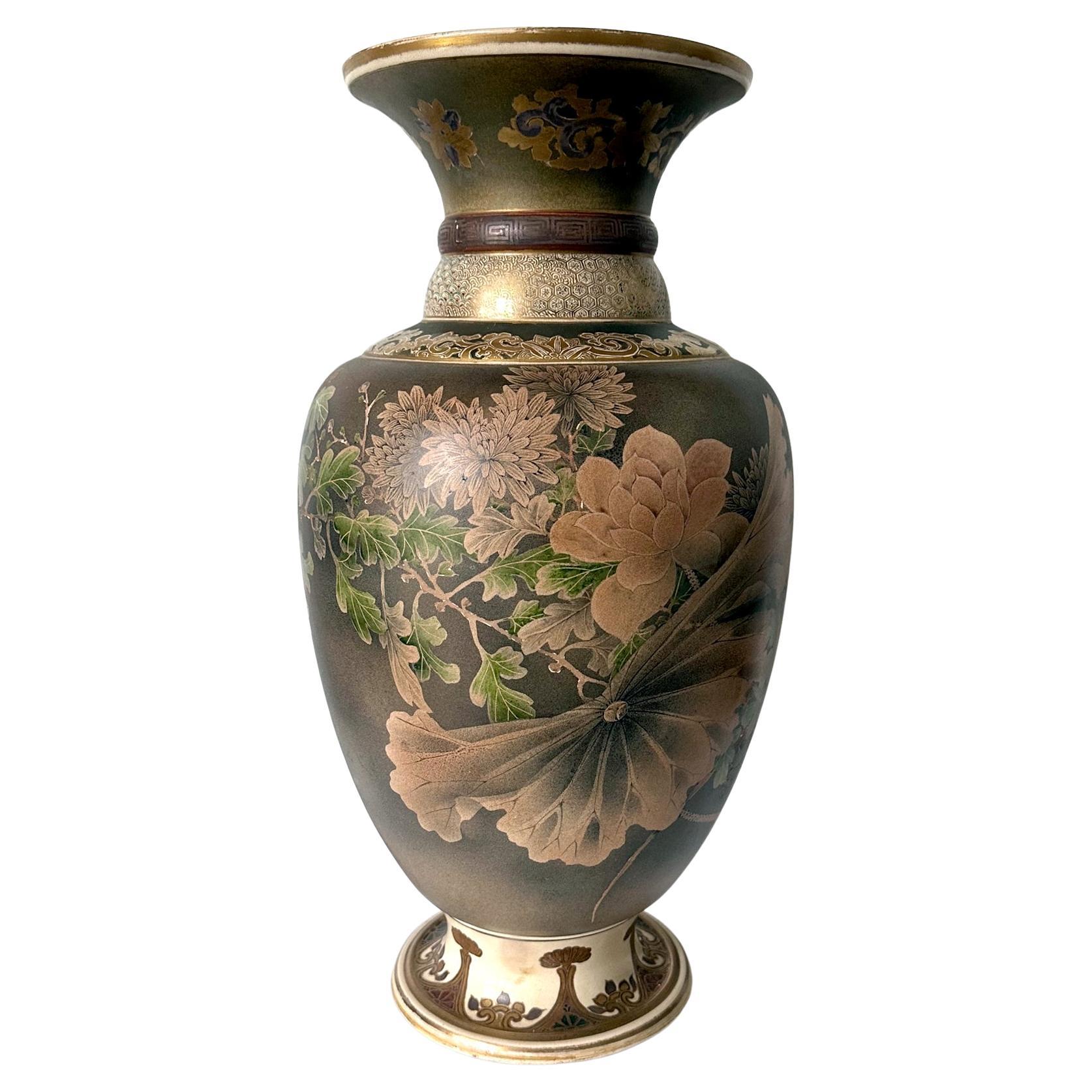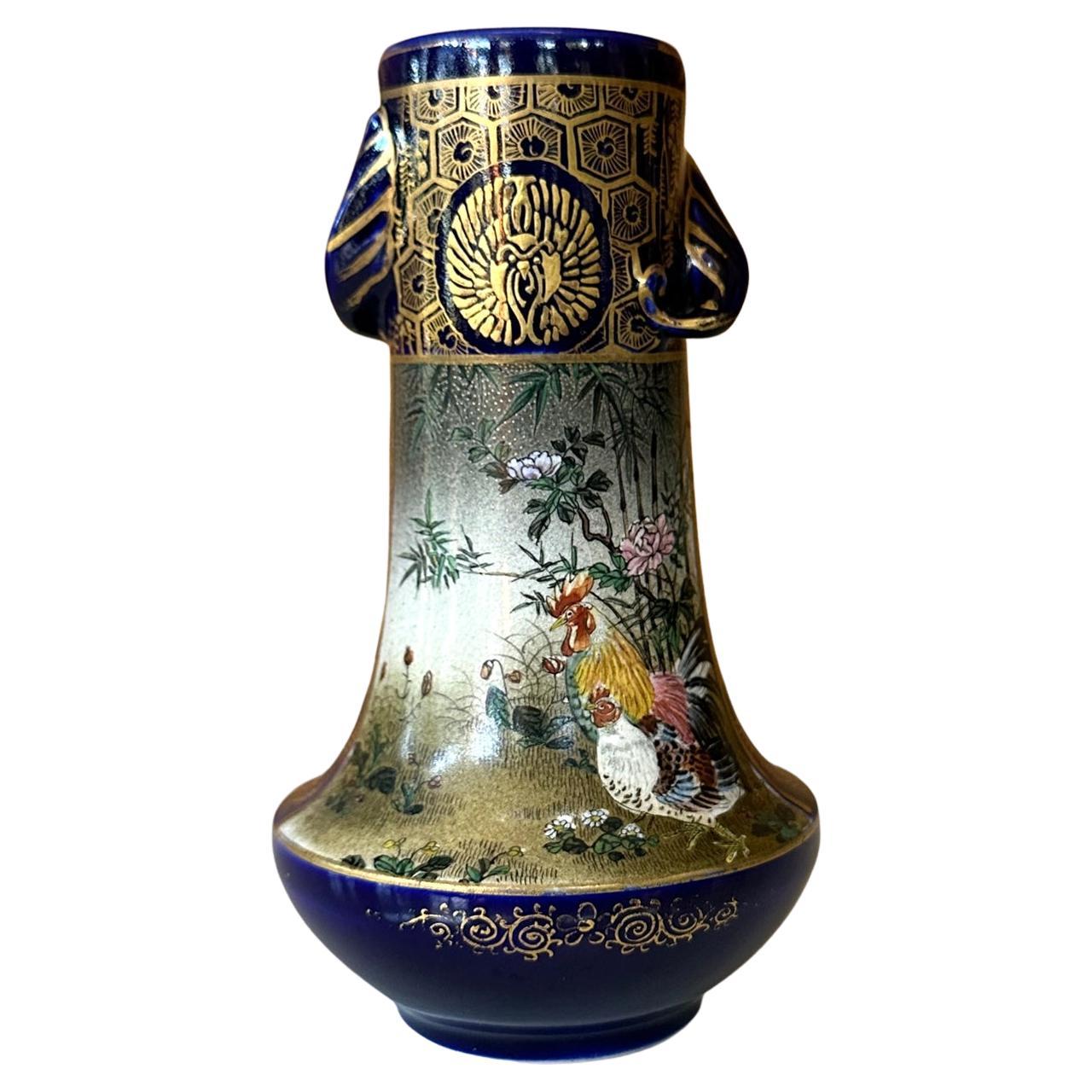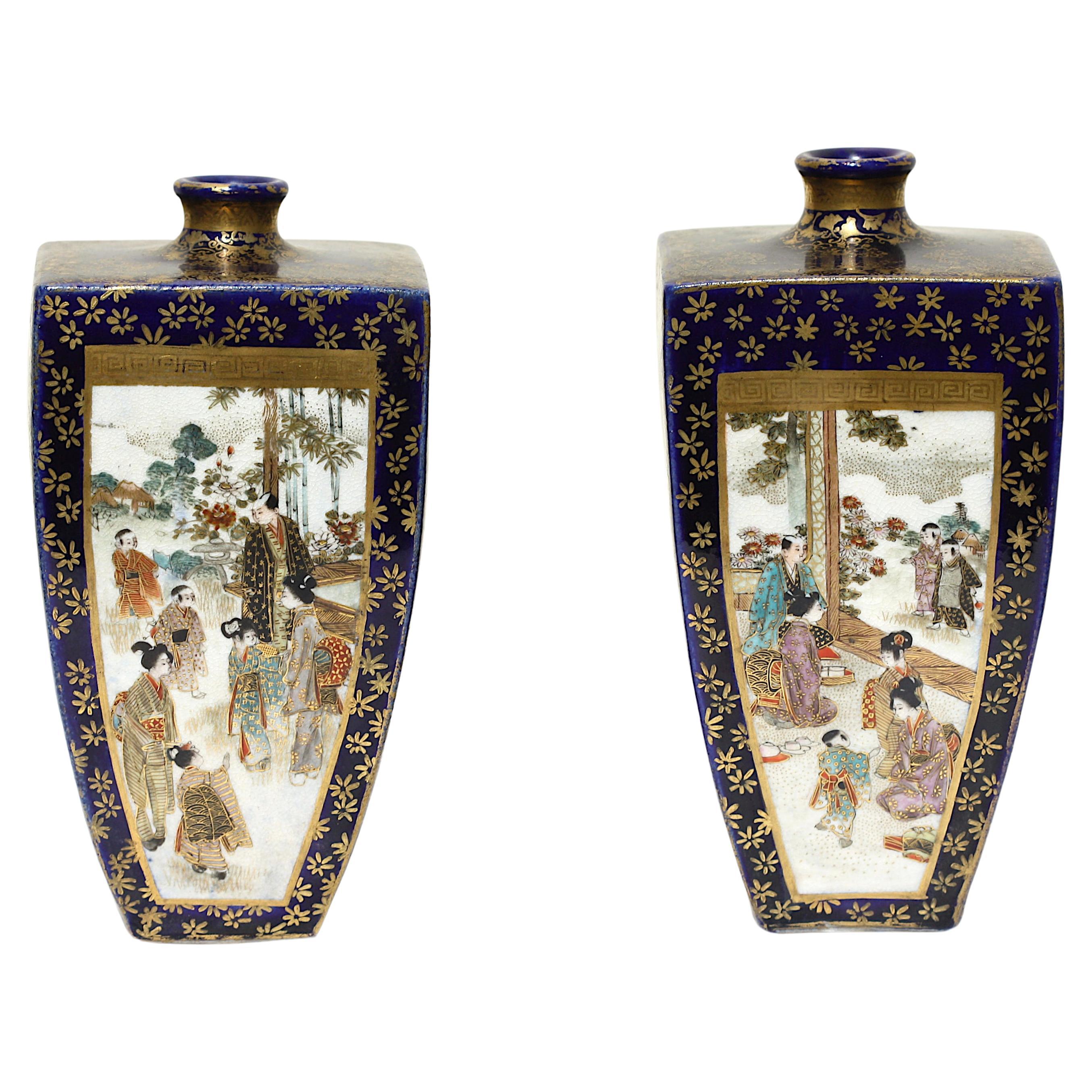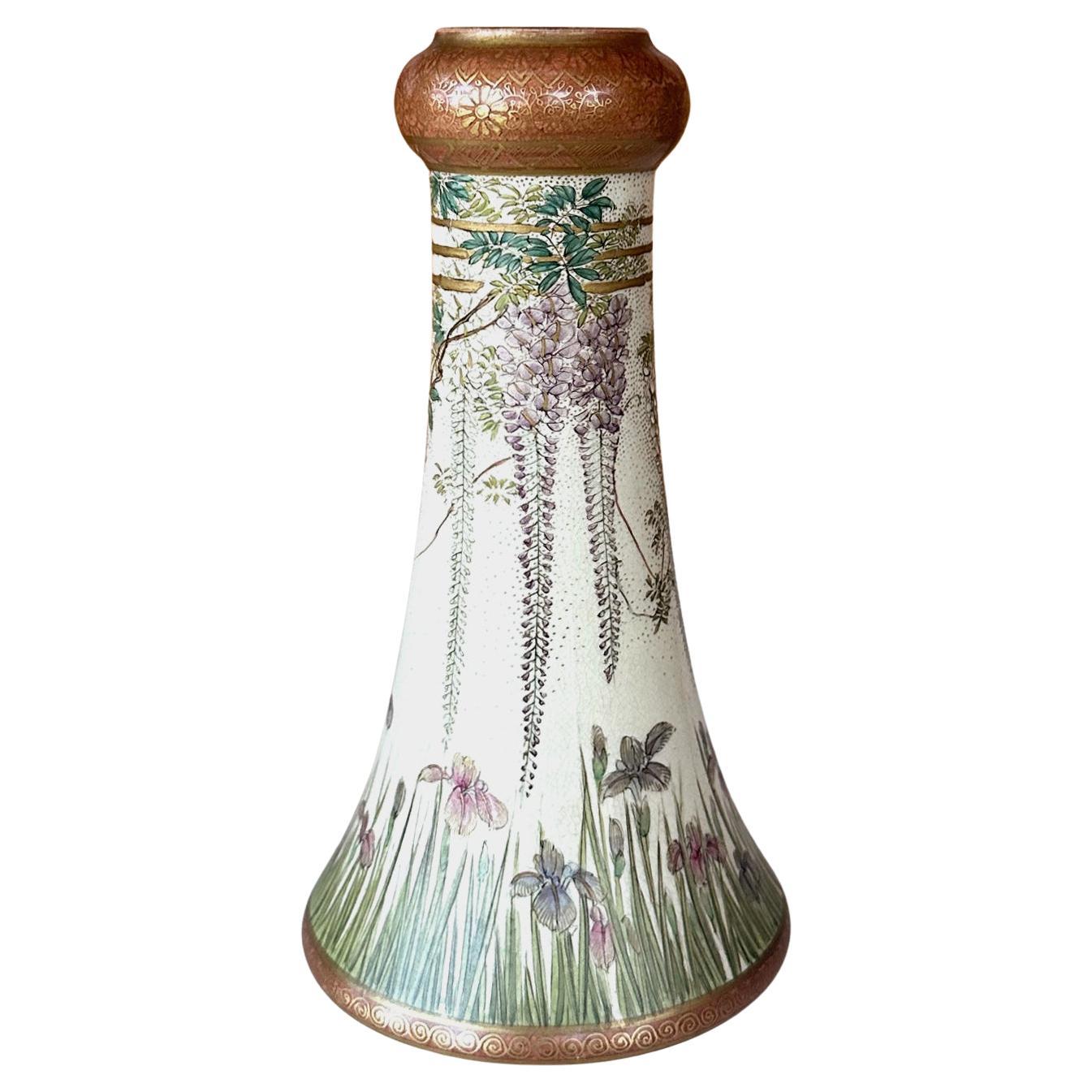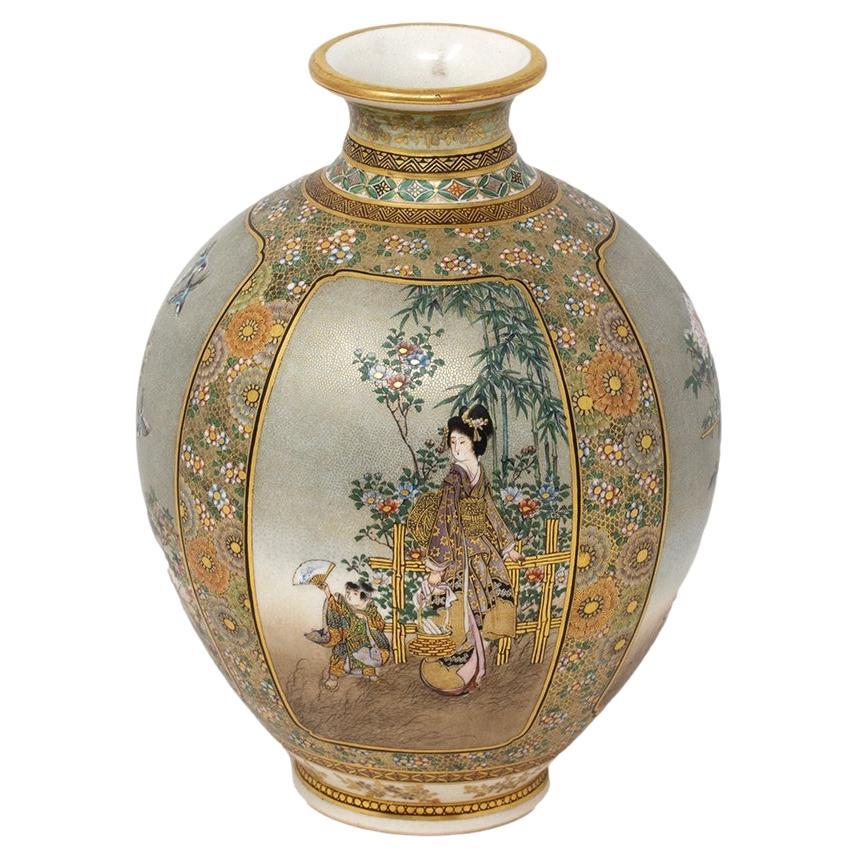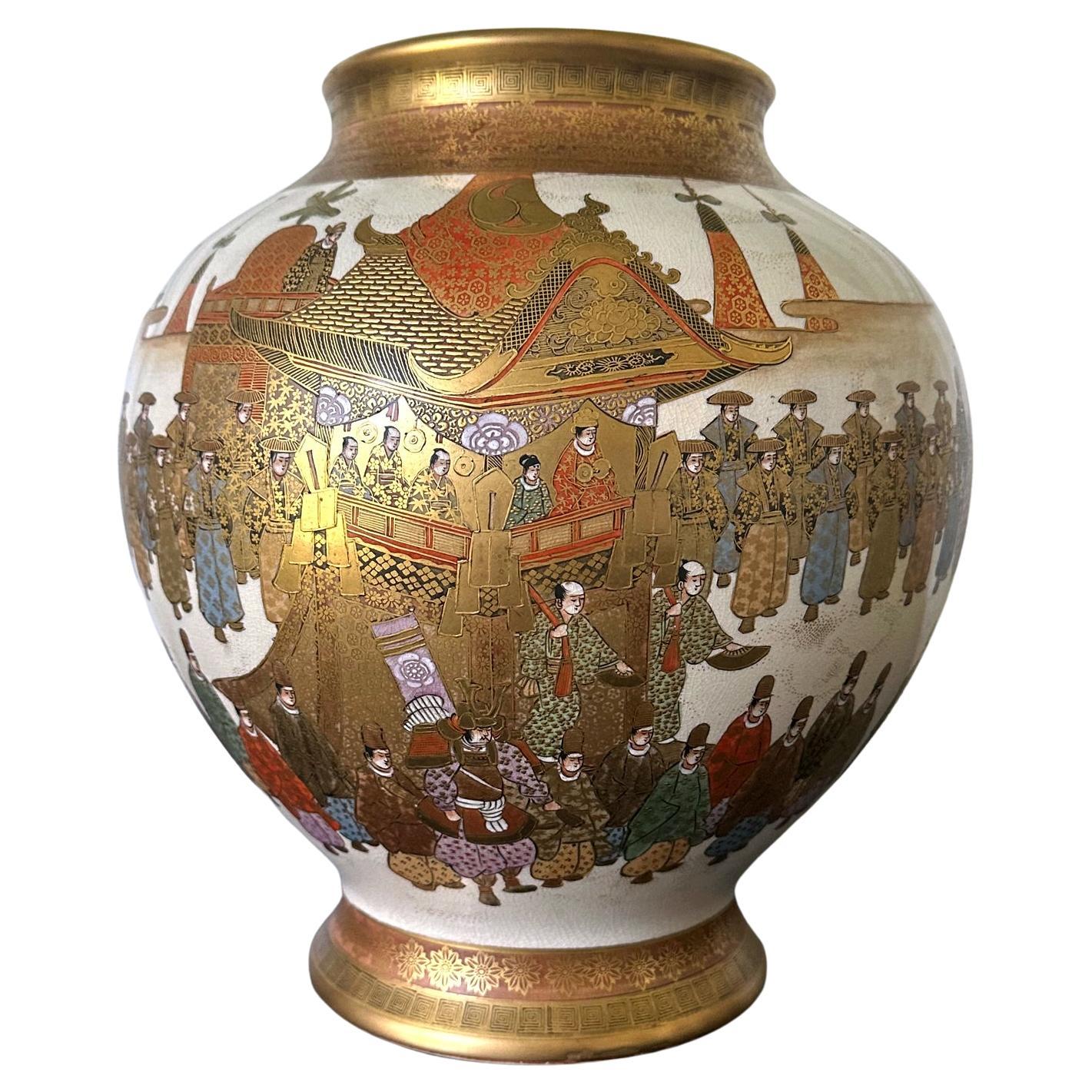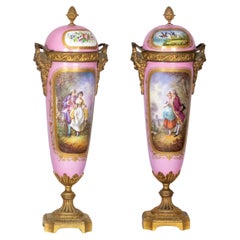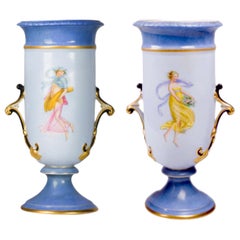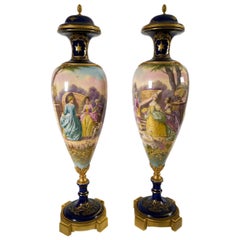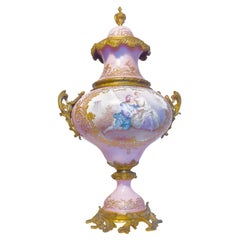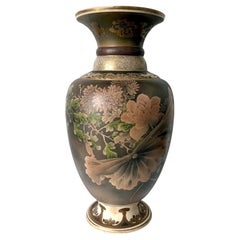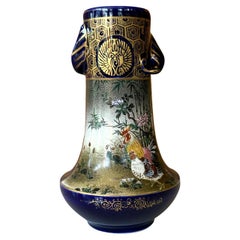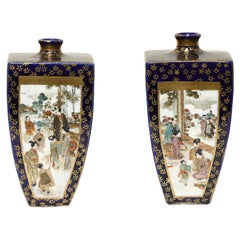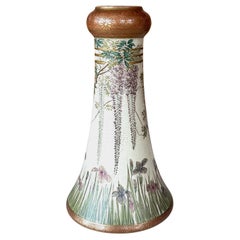Items Similar to Pair of Kinkozan Satsuma Vases with Gold Kinrande, 19th Century
Video Loading
Want more images or videos?
Request additional images or videos from the seller
1 of 9
Pair of Kinkozan Satsuma Vases with Gold Kinrande, 19th Century
About the Item
A pair of signed Sbei Kinkozan VII Satsuma polychrome porcelain vases with gold standard (kinrande) from Kyoto, Imperial City, Japan.
Kyo Satsuma ceramics contain intricately detailed paintings that are wonderfully done in multicolored glazes and glittering gold.
The name alludes to the fact that they were created in Kyoto (Ky), but originated in Satsuma, present-day Kagoshima Prefecture, Kyushu.
The Kinkzan were a notable family of Kyoto Awataguchi potters who manufactured ceramics used in Shren'in, the imperial family's shrine, and by the shoguns of the Edo government in the Higashiyama region of Kyoto. Kinkzan Sbei VI's Ky Satsuma skills were subsequently passed down to his son, Kinkzan Sbei VII (1868-1927).
- Creator:Kinkozan (Artist)
- Dimensions:Height: 12.21 in (31 cm)Diameter: 7.88 in (20 cm)
- Sold As:Set of 2
- Style:Meiji (Of the Period)
- Materials and Techniques:
- Place of Origin:
- Period:
- Date of Manufacture:19th century
- Condition:Wear consistent with age and use. Minor losses. Minor fading.
- Seller Location:Lisbon, PT
- Reference Number:Seller: 8621stDibs: LU9157244842392
About the Seller
5.0
Gold Seller
Premium sellers maintaining a 4.3+ rating and 24-hour response times
Established in 2023
1stDibs seller since 2023
5 sales on 1stDibs
Typical response time: <1 hour
- ShippingRetrieving quote...Shipping from: Porto, Portugal
- Return Policy
Authenticity Guarantee
In the unlikely event there’s an issue with an item’s authenticity, contact us within 1 year for a full refund. DetailsMoney-Back Guarantee
If your item is not as described, is damaged in transit, or does not arrive, contact us within 7 days for a full refund. Details24-Hour Cancellation
You have a 24-hour grace period in which to reconsider your purchase, with no questions asked.Vetted Professional Sellers
Our world-class sellers must adhere to strict standards for service and quality, maintaining the integrity of our listings.Price-Match Guarantee
If you find that a seller listed the same item for a lower price elsewhere, we’ll match it.Trusted Global Delivery
Our best-in-class carrier network provides specialized shipping options worldwide, including custom delivery.More From This Seller
View AllPair Of French Ormolu Pink Sevres Vases, (19th Century)
By Manufacture Nationale de Sèvres
Located in Lisbon, PT
A beautiful antique pair of decorative pink porcelain Sèvres Style urnes with a hand-painted background of a lovers scene.
In the back there is a scene of a bouquet of flowers. Mounted Bacchus/ Dionysus bronze...
Category
Antique 19th Century French Rococo Vases
Materials
Bronze
Pair Of Napoleon III Porcelain Vases, (19th Century), Jean Nast
By Nast
Located in Lisbon, PT
This exquisite pair of 19th century French porcelain vases features a striking royal cobalt blue glaze and a hand-painted yellow dress motif. Attributed to the Nast manufactory, this...
Category
Antique 19th Century French Napoleon III Vases
Materials
Porcelain
Pair Of Ormolu Porcelain Vases Manufature Nationale Sèvres, 19th Century
By Manufacture Nationale de Sèvres
Located in Lisbon, PT
A pair of cobalt blue porcelain mounted ormolu vases from Sèvres with gilded bronze stands, decorated with Rococo gold enamel florals and polychrome floral swirls, gallant decoration...
Category
Antique 19th Century French Napoleon III Vases
Materials
Metal, Bronze
French Ormolu Mounted Pink Sevres Vase, (19th Century)
By Manufacture Nationale de Sèvres
Located in Lisbon, PT
A beautiful antique decorative pink porcelain Sèvres Style urn with a hand-painted background of a guitar musician and his lady. A Serenata scene. In the back a lake scene with a ca...
Category
Antique 19th Century French Napoleon III Urns
Materials
Metal, Bronze
Jean Nast Napoleon III Porcelain Vase, 19th Century
By Nast
Located in Lisbon, PT
This exquisite 19th century French porcelain vase features a striking royal cobalt blue glaze and a hand-painted yellow dress motif. Attributed to the Nast manufactory, this unique p...
Category
Antique 19th Century French Napoleon III Vases
Materials
Porcelain
19th Century White Glass Floral Painted Vase with Ribbons by Jerome Massier
By Jerome Massier
Located in Lisbon, PT
An early 19th century Massier white glass floral painted vase with applied ribbons attributed to the artist Jerome Massier.
Category
Early 20th Century French Art Nouveau Vases
Materials
Glass
You May Also Like
Large Japanese Satsuma Ceramic Vase Kinkozan
By Kinkozan
Located in Atlanta, GA
A large Japanese ceramic vase from the end of Meiji period circa 1890-1910s by Kinkozan (1645-1927). One of the largest studio manufacturers of the export ceramics at the time based in Kyoto. In the typical style of satsuma made at the turn of 20th century, the vase is elaborately decorated with a rather unusual kinran-de (gold paint) and green enamel highlight on a mottled brown background. The painterly decoration depicts a large seasonal floral arrangement in a circular fashion. Besides the obviously superb craftsmanship, what sets this particular vase apart from many lower quality and mass-produced pieces is its tone-on-tone color pallet that is visually somber and the small and sensitive details that heralds the change of the seasons. When the viewer goes beyond the first casual glimpse of the blossom and foliage, one would notice that on the edges of certain leaves as well as along the stalks, there accumulates a very thin layer of the white dust that represents the frost. The flower in bloom are chrysanthemums. Despite of being splendid, they are the messengers of the autumn. The large lotus leaf was subtly rendered in a bended and slightly withered manner, just past its prime. Although the lotus is still in bloom, the prominent seed pod indicates it may be the last for the season. The sentimental capture of the change of the seasons is not unusual in Japanese art. This vase poetically represents such a subtle transition from summer to fall, perhaps depicting the very first frost.
The neck of the vase is also slightly unusual with two rolled rings...
Category
Early 20th Century Japanese Meiji Ceramics
Materials
Ceramic
Fine Japanese Ceramic Satsuma Vase by Kinkozan
By Kinkozan
Located in Atlanta, GA
A miniature Japanese ceramic vase from the end of Meiji period circa 1880s- 1910s by Kinkozan (1645-1927). One of the largest studio manufacturers of the export ceramics at the time ...
Category
Early 20th Century Japanese Meiji Ceramics
Materials
Ceramic
A Pair Satsuma earthenware vases by Kinkozan, Meiji period
By Kinkozan
Located in West Palm Beach, FL
A Pair Satsuma earthenware vases by Kinkozan, Meiji period
of square section, decorated with birds and flowers alternating with figures, all reserved on a midnight-blue ground with floral designs, each signed Kinkozan zo...
Category
20th Century Vases
Materials
Ceramic
Fine Japanese Enameled Satsuma Vase by Kinkozan Meiji Period
By Kinkozan
Located in Atlanta, GA
A ceramic satsuma ware vase with very fine surface decoration made by Kinkozan circa 1880-1900s of late Meiji Period. The vase is of an elegant and relatively rare form with a trumpet shape body and the so-called garlic neck and opening. The surface is exquisitely decorated in a floral scheme with gilt and a light jewel-tone enamel. The top part showcases large bundles of wisteria blossom in white and purple, cascading down from a gilt wood trellis...
Category
Antique 1880s Japanese Meiji Ceramics
Materials
Ceramic
Antique Japanese Meiji Period (1868-1912) Satsuma Vase by Kinkozan
By Kinkozan
Located in Newark, England
Signed Kinkozan 金光山
From our Japanese collection, we are delighted to offer this Japanese Satsuma Vase by Kinkozan. The vase is potted in globular form with a tightly pinched neck and rolled top rim beautifully decorated with four highly detailed individual panelled scenes. The first a Geisha baring a gilt basket with her child playing with a fan infant of a gilt fence encompassing blossoming foliage and bamboo plants. The second scene depicts two birds, a Red Headed Japanese Wood Pigeon and a white dove in the foreground with a similar gilt fence with blossoming kiku flowers (chrysanthemums). The third scene is painted as a bustling village community with multiple figures going about their daily jobs, a central Palanquins can be seen with two figures carrying a seating figure. To the background a mountainous river landscape can viewed bordering the top left corner. The final scene appears similar to the opposing one with birds swooping high above a polychrome Japanese...
Category
Antique Late 19th Century Japanese Meiji Vases
Materials
Ceramic, Earthenware, Pottery
Fine Japanese Satsuma Ceramic Jar with Gilt Decoration by Kinkozan
By Kinkozan
Located in Atlanta, GA
A large Japanese ceramic vase from end of Meiji period circa 1880s- 1910s by Kinkozan (1645-1927). One of the largest studio manufacturers of the export ceramics at the time based in Kyoto. In the typical style of satsuma made at the turn of 20th century, the vase is of a moon jar shape and finely decorated with kinran-de (gold paint) on a cream white background with even fine crackles. What sets this particular vase apart from many lower quality and mass-produced pieces is the meticulously renditioned surface decoration. Lavishly gilded with a continuous design, the carefully composed imagery depicts an elaborately decorated float cart in a festival parade. A group of people are seated within the float with a woman and a child standing in the front. Surrounding the float are streams of marchers dressed...
Category
Early 20th Century Japanese Meiji Ceramics
Materials
Ceramic
